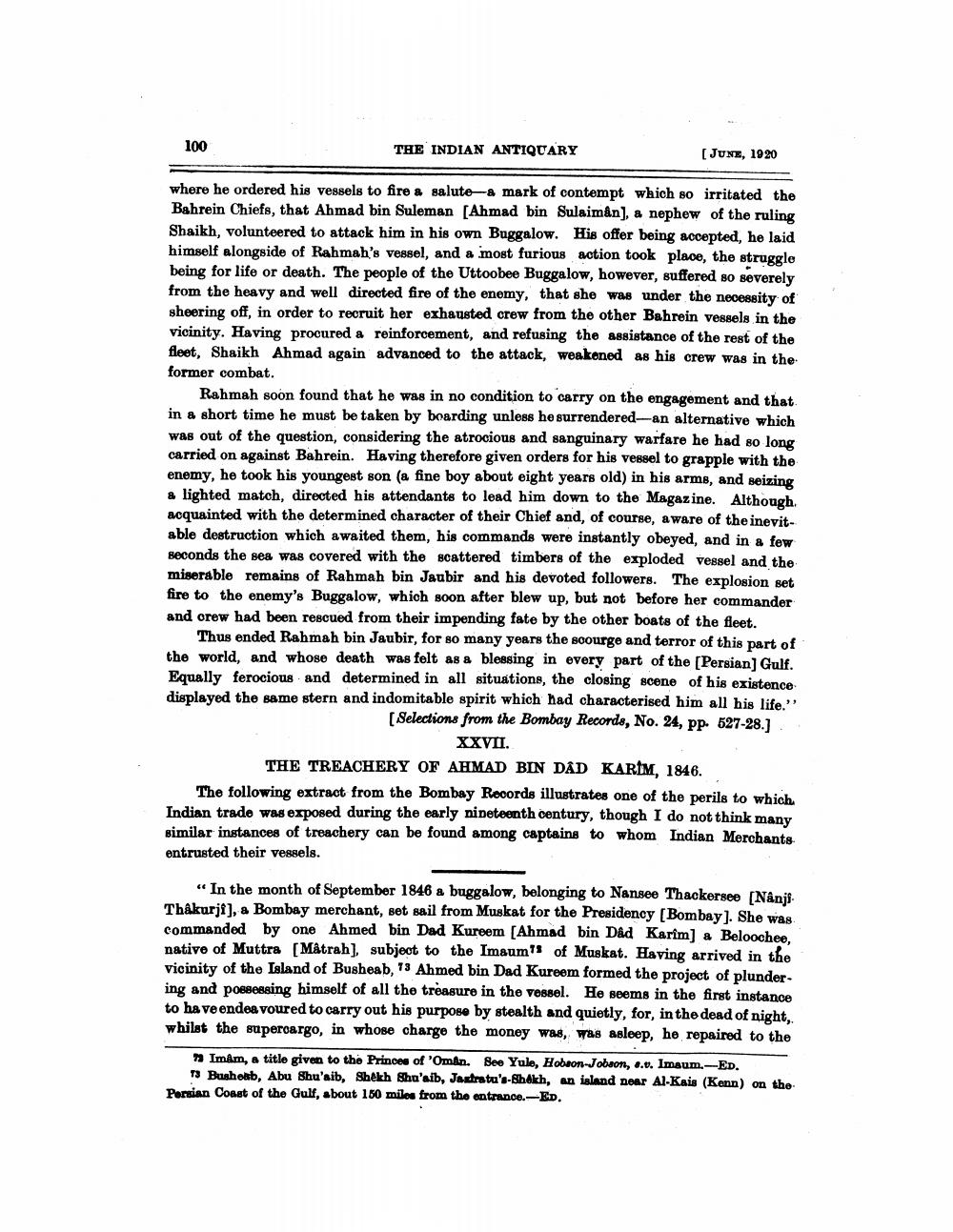________________
100
THE INDIAN ANTIQUARY
[JUNE, 1920
where he ordered his vessels to fire & salute-a mark of contempt which so irritated the Bahrein Chiefs, that Ahmad bin Suleman (Ahmad bin Sulaiman), a nephew of the ruling Shaikh, volunteered to attack him in his own Buggalow. His offer being accepted, he laid himself alongside of Rahmah's vessel, and a most furious action took place, the struggle being for life or death. The people of the Uttoobee Buggalow, however, suffered so severely from the heavy and well directed fire of the enemy, that she was under the necessity of sheering off, in order to recruit her exhausted crew from the other Bahrein vessels in the vicinity. Having procured a reinforcement, and refusing the assistance of the rest of the fleet, Shaikh Ahmad again advanced to the attack, weakoned as his crew was in the former combat.
Rahmah soon found that he was in no condition to carry on the engagement and that in a short time he must be taken by boarding unless he surrendered - an alternative which was out of the question, considering the atrocious and sanguinary warfare he had so long carried on against Bahrein. Having therefore given orders for his vessel to grapple with the enemy, he took his youngest son (a fine boy about eight years old) in his arms, and seizing a lighted match, directed his attendants to lead him down to the Magazine. Although. acquainted with the determined character of their Chief and, of course, aware of the inevitable destruction which awaited them, his commands were instantly obeyed, and in a few seconds the sea was covered with the scattered timbers of the exploded vessel and the miserable remains of Rahmah bin Jaubir and his devoted followers. The explosion set fire to the enemy's Buggalow, which soon after blew up, but not before her commander and crew had been rescued from their impending fate by the other boats of the fleet.
Thus ended Rahmah bin Jaubir, for so many years the scourge and terror of this part of the world, and whose death was felt as a blessing in every part of the [Persian) Gulf. Equally ferocious and determined in all situations, the closing scene of his existence displayed the same stern and indomitable spirit which had characterised him all his life."
[Selections from the Bombay Records, No. 24, pp. 527-28.]
XXVII. THE TREACHERY OF AHMAD BIN DAD KARIM, 1846. The following extract from the Bombay Records illustrates one of the perils to which Indian trade was exposed during the early nineteenth century, though I do not think many similar instances of treachery can be found among captains to whom Indian Merchants. entrusted their vessels.
In the month of September 1846 a buggalow, belonging to Nansee Thackersee [Nanji Thákurji], a Bombay merchant, set sail from Muskat for the Presidency (Bombay). She was commanded by one Ahmed bin Dad Kureem [Ahmad bin Dad Karim) a Beloochee. native of Muttra (Mátrah), subject to the Imaum" of Muskat. Having arrived in the vicinity of the Island of Busheab, 13 Ahmed bin Dad Kureem formed the project of plundering and possessing himself of all the treasure in the vessel. He seems in the first instance to have endeavoured to carry out his purpose by stealth and quietly, for, in the dead of night, whilst the superoargo, in whose charge the money was, was asleep, he repaired to the
na Imâm, a title given to the Princes of 'Omfn. See Yule, Hoheon-Jobson, s.o. Imaum.-ED.
T3 Bushokb, Abu Shu'aib, Shekh Sha'sib, Jadratu's-Shokch, an island near Al-Kais (Kenn) on the Persian Coast of the Gulf, about 150 miles from the entrance.-ED.




